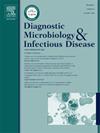Impact of COVID-19 pandemic on toxinogenic Clostridioides difficile infections and correlation with multidrug-resistant bacterial infections
IF 1.8
4区 医学
Q3 INFECTIOUS DISEASES
Diagnostic microbiology and infectious disease
Pub Date : 2025-07-18
DOI:10.1016/j.diagmicrobio.2025.117014
引用次数: 0
Abstract
Clostridioides difficile infection (CDI) is one of the most common healthcare-associated infections, contributing to significant morbidity and mortality, particularly in hospitalized patients. Its incidence is influenced by infection control measures, antimicrobial stewardship, and hospital hygiene protocols. The Coronavirus disease 2019 (COVID-19) pandemic led to the widespread adoption of stringent infection prevention strategies. These measures may have influenced the incidence of CDI. At the university hospital Policlinico Umberto I in Rome, we conducted a retrospective analysis of CDI cases across three periods: preCOVID-19, COVID-19 and postCOVID-19. Our findings revealed a statistically significant decrease in CDI cases during the COVID-19 period compared to the preCOVID-19 period, as well as in the postCOVID-19 period compared to the COVID-19 period. Additionally, we explored the potential association between CDI and multidrug-resistant organisms (MDRO). Our findings indicate a reduction in MDRO infections among patients with CDI in the COVID-19 and postCOVID-19 periods compared to the preCOVID-19 period. These results highlight the potential impact of infection control strategies on CDI incidence and suggest a possible relationship between CDI and MDRO infection. Further research is needed to assess the long-term effects of these measures and their implications for future infection prevention strategies.
COVID-19大流行对致毒艰难梭菌感染的影响及其与耐多药细菌感染的相关性
艰难梭菌感染(CDI)是最常见的卫生保健相关感染之一,导致显著的发病率和死亡率,特别是在住院患者中。其发病率受感染控制措施、抗菌药物管理和医院卫生规程的影响。2019冠状病毒病(COVID-19)大流行导致广泛采用严格的感染预防战略。这些措施可能影响了CDI的发生率。在罗马波利尼科·翁贝托第一大学医院,我们对COVID-19前、COVID-19和COVID-19后三个时期的CDI病例进行了回顾性分析。我们的研究结果显示,与COVID-19前期相比,COVID-19期间CDI病例有统计学意义的减少,与COVID-19期间相比,COVID-19后时期也有统计学意义的减少。此外,我们还探讨了CDI与多药耐药菌(MDRO)之间的潜在关联。我们的研究结果表明,与COVID-19前相比,COVID-19和COVID-19后时期CDI患者的MDRO感染有所减少。这些结果突出了感染控制策略对CDI发病率的潜在影响,并提示CDI与MDRO感染之间可能存在关系。需要进一步的研究来评估这些措施的长期效果及其对未来感染预防策略的影响。
本文章由计算机程序翻译,如有差异,请以英文原文为准。
求助全文
约1分钟内获得全文
求助全文
来源期刊
CiteScore
5.30
自引率
3.40%
发文量
149
审稿时长
56 days
期刊介绍:
Diagnostic Microbiology and Infectious Disease keeps you informed of the latest developments in clinical microbiology and the diagnosis and treatment of infectious diseases. Packed with rigorously peer-reviewed articles and studies in bacteriology, immunology, immunoserology, infectious diseases, mycology, parasitology, and virology, the journal examines new procedures, unusual cases, controversial issues, and important new literature. Diagnostic Microbiology and Infectious Disease distinguished independent editorial board, consisting of experts from many medical specialties, ensures you extensive and authoritative coverage.

 求助内容:
求助内容: 应助结果提醒方式:
应助结果提醒方式:


